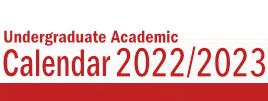International Student Fees
The actual fee structure for international students is outlined in the appropriate section of the calendar. This information is taken directly from Section 4.1 of the Ministry of Training, Colleges and Universities Ontario Operating Funds Distribution Manual.
For a list of international fees, click here.
International fees will apply to students who do not fall into one of the following categories:
Canadian Citizens
A citizen of Canada within the meaning of the Citizenship Act, or a person registered as an Indian within the meaning of the Indian Act.
Permanent Residents
A permanent resident within the meaning of the Immigration and Refugee Protection Act:
a) a person who has been granted permanent resident status and has not had that status revoked; or
b) a person who has been approved in-principle for permanent resident status in Canada. Evidence of this is a letter which confirms that Citizenship and Immigration Canada has determined that he/she is eligible for immigration to Canada or meets the eligibility requirements to apply for permanent resident status in Canada. Such letters must be dated prior to the enrolment count date and presented prior to the enrolment report due date.
A person who is the dependent of a Canadian citizen or permanent resident of Canada
Visitor
A visitor, and his/her dependents, who is authorized to work in Canada having been issued a work permit. The following students are excluded from this category:
i. A visitor who is a graduate teaching assistant;
ii. An international student holding a work permit to complete his/her co-op, internship or medical residency employment;
iii. An international student holding an open work permit for post-graduate work (usually for up
to three years of work opportunities upon graduation);
iv. An international student whose spouse or common-law partner has received a work permit
as a result of the international student holding a valid Study Permit;
v. An international student holding an Off-Campus Work Permit.
A visitor who is admitted to and remaining in Canada with official accreditation from the Canadian Department of Foreign Affairs and International Trade, who has entered Canada, or is in Canada, to carry out her/his official duties as:
i. a diplomatic or consular officer;
ii. or as a Canadian government-accredited representative or official of a country other than
Canada, of the United Nations or any of its agencies, of any intergovernmental
organizations of which Canada is a member;
iii. or as a dependent ,or a member of the staff of any such diplomat, consular office, representative or official accredited to Canada by the Canadian government;
iv. or a member of a foreign military force or of a civilian component; thereof admitted to
Canada under the Visiting Forces Act or any dependents of such personnel.
Protected Person
A person, and his/her dependents, who has been determined to be a protected person, including a Convention refugee or a person in need of protection, within the meaning of subsection 95(2) of the Immigration and Refugee Protection Act by the Immigration and Refugee Board (IRB) or the Minister of Citizenship and Immigration Canada. A protected person document issued under section 31(1) of the Immigration and Refugee Protection Act or a "notice of decision" issued by the Minister of Citizenship and Immigration Canada or by the IRB must be presented.
A refugee claimant who applied to the federal government for Convention refugee status prior to January 1,1989, and can provide documentation from Citizenship and Immigration Canada to that effect.
Definitions:
Dependents
Dependents are defined as:
a) a spouse;
b) a common-law partner;
c) a dependent child or the dependent child of a spouse or common-law partner;
or
d) a dependent child of the dependent child referred to above.
Dependent Child
A dependent child is a child who is a biological child who has not been adopted by a person other than the spouse or common-law partner, or an adopted child and who is in one of the following situations of dependency:
a) under age 22 and not a spouse or common-law partner;
b) enrolled continuously at a college, university or other educational institution and dependent
substantially on the financial support of the parent since before age 22 or since becoming a spouse or common-law partner if that occurred before age 22; or
c) a person with a disability who has been financially supported substantially by his or her parents, and who is unable to be self-supporting because of the disability.
An affidavit signed by both spouses, confirming that they are living together in a conjugal relationship for not less than three years, or that they are living together in a conjugal relationship and are raising any children of whom they both are the natural or adoptive parent, is required to verify their common-law status.
For an exemption from international fees, you must complete the Certificate of Exemption from International Fees.






